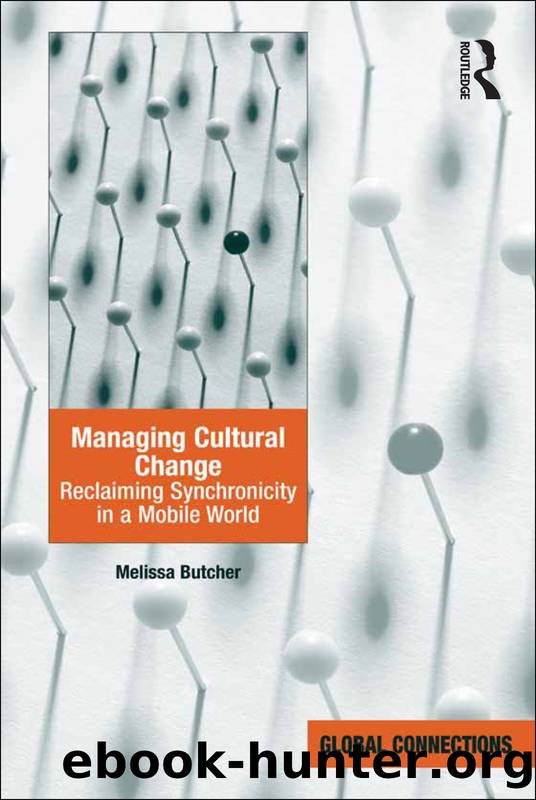Managing Cultural Change: Reclaiming Synchronicity in a Mobile World by Melissa Butcher

Author:Melissa Butcher [Butcher, Melissa]
Language: eng
Format: epub
Tags: Political Science, Globalization
ISBN: 9781317101826
Google: ZdooDAAAQBAJ
Goodreads: 30203014
Publisher: Routledge
Published: 2011-12-01T00:00:00+00:00
Mobile Subjectivity
I have drawn similarities between the different cohorts in the studies presented in these chapters particularly in the way that mobility generates strategies for managing the affective responses to change shared among them. Expressions of confusion and ambiguity, being âhomelessâ or liminally in-between cultural spaces, have been met with strategies of demarcating difference and re-asserting belonging such as the re-placing of home noted above. However, the cohortsâ differential place in social hierarchies meant that the professionals in the Global Workplace study were unlikely to ever face the depth of public questioning as to whether they belong or not that young people from migrant backgrounds do. For the most part these professionals managed the process of change from the position of a single identity (with the exceptions of Gina and Andrew from Asian-Australian backgrounds, noted above). For the youth cohorts, many of them, as noted in Chapter 3, were highly conscious of embodying multiple identities, some of them politicised by external points of authority such as the State.
There is then an inherent inequality in the respective positions of the research cohorts in managing change, in the re-evaluation of their own sense of self and managing the expectations of others in new or transforming cultural contexts. This is reflected in the divergent outcomes of re-evaluating cultural frames of reference. For example, there was not the same sense of cultural melange within the narratives or on the bodies of the participants in the Global Workplace study as there was for the youth cohorts. Hybridity is much less applicable as a conceptual tool in this scenario. However, as transnational professionals adapted, developing cultural knowledge over time, some were able to develop the same sense of mobile subjectivity demonstrated by many of the young people in the India and Generate projects. Molinsky (2007) has referred to this as a form of âcross-cultural code-switchingâ (see also Woodward et al. 2008).
Mobile subjectivity involved adapting to the cultural space these transnational professionals found themselves in, through strategic self-presentation and âsense-making adjustmentâ (Lowe et al. 2011: 34). However, this did not necessarily incur the same levels of reflexivity on questions of identity noted among young people in Chapter 3. There was no questioning of whether they were Australian or not, and no use of the hyphen. Yet the capacity for mobile subjectivity results from the same simultaneous dynamic of demarcating distinction and belonging, that is, the desire to manage or incorporate new possibilities, and the desire to re-place home and maintain a degree of continuity. There were very pragmatic reasons for âcultural code-switchingâ, in terms of business development. Deploying mobile subjectivities was at times a deliberate strategy to enhance economic and social capital (see Ongâs 1999 discussion of âflexible citizenshipâ). For example, Michelle, a business woman who had worked for six years in Singapore, âockerâs things upâ4 when socialising with Australians, but shifts her approach to accommodate Singaporean frames of reference, at least by acknowledging place if not values, when interacting with local associates. She adopts this position
Download
This site does not store any files on its server. We only index and link to content provided by other sites. Please contact the content providers to delete copyright contents if any and email us, we'll remove relevant links or contents immediately.
Full Circle by Michael Palin(3449)
Cuba by Lonely Planet(2634)
Birds of New Guinea by Pratt Thane K.; Beehler Bruce M.; Anderton John C(2255)
Lonely Planet Australia by Lonely Planet(2082)
Discover Australia by Lonely Planet(1948)
Beyond the Coral Sea by Michael Moran(1914)
Lonely Planet Maldives (Travel Guide) by Planet Lonely & Masters Tom(1861)
Kings Cross by Louis Nowra(1798)
Borneo Travel Guide by Lonely Planet(1725)
Ten Degrees of Reckoning: The True Story of a Family's Love and the Will to Survive by Hester Rumberg(1654)
Lonely Planet Australia (Travel Guide) by Lonely Planet & Lonely Planet(1594)
Lonely Planet South Australia & Northern Territory by Lonely Planet(1498)
Lonely Planet Pocket Hobart by Lonely Planet(1416)
The Sex Lives of Cannibals: Adrift in the Equatorial Pacific by J. Maarten Troost(1380)
Kiwi Tracks by Lonely Planet(1335)
Lonely Planet Australia (Travel Guide) by Lonely Planet(1324)
East Coast Australia by Lonely Planet(1302)
Epic Hikes of the World by Lonely Planet(1299)
Personal 03 - Personal Secrets by K.C. Wells(1280)
